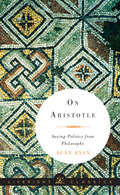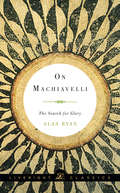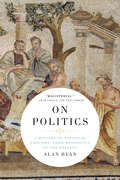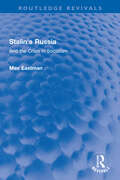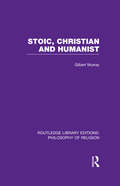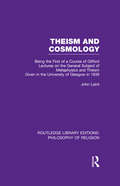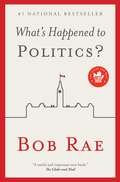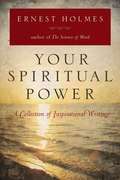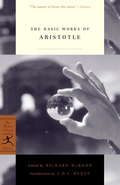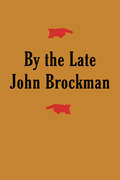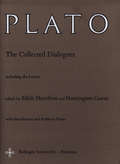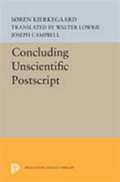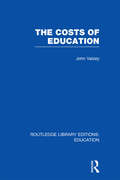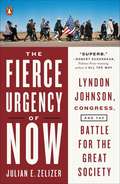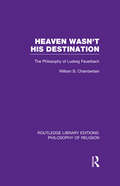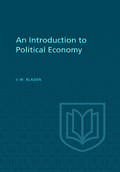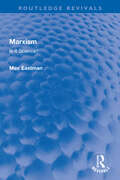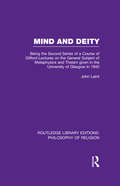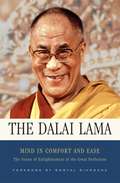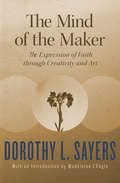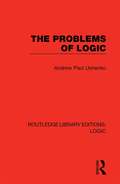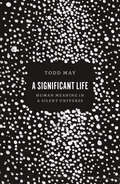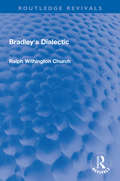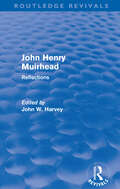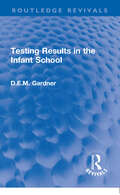- Table View
- List View
On Aristotle: Saving Politics from Philosophy (Liveright Classics)
by Alan RyanAn essential, comprehensive, and accessible guide to the life and works of Aristotle. In On Aristotle: Saving Politics from Philosophy, Alan Ryan examines Plato's most famous student and sharpest critic, whose writing has helped shape over two millennia of Western philosophy, science, and religion. The first thinker to posit that a society should be ruled by laws and not men, Aristotle was born in Stagira, Macedon, in 384 BCE. He would go on to join Plato's Academy and eventually become tutor to Alexander the Great. During his lifetime he would see the revival of Athens following its destruction in the Peloponnesian War, before the ultimate extinction of its radical form of democracy after the Macedonian conquest. Aristotle's strongly empirical cast of mind was brought to bear on a stunning range of subjects, from rhetoric to physics, from the history of political institutions and mathematics to zoology and botany. The resulting system dominated European thought from the thirteenth to seventeenth centuries. In Nicomachean Ethics and Politics--both excerpted here--Aristotle attempted to delineate the ideal virtues of a both public and private life as well as critique the utopian antipolitics of his former teacher, Plato. For Aristotle, life in a polis was the natural state of man and provided the greatest opportunity for human beings to fulfill their potential. Unlike his scientific theories, which would eventually be displaced by Galileo, Newton, and Darwin, Aristotle's meticulous thinking on the nature of human affairs, ethics, politics, citizenship, and virtue in a civil society remains as vital today as it was in his own time.
On Machiavelli: The Search for Glory (Liveright Classics)
by Alan RyanAn essential, comprehensive, and accessible guide to the life and works of Machiavelli. In On Machiavelli: The Search for Glory, Alan Ryan illuminates the political and philosophical complexities of the often-reviled godfather of realpolitik. Thought by some to be the founder of Italian nationalism, regarded by others to be a reviver of the Roman Republic as a model for the modern Western world, Machiavelli remains a contentious figure. Often outraging popular opinion with his insistence on the amoral nature of power, Machiavelli eschewed the world as it ought to be in favor of a forthright appraisal of the one that is. Perhaps more than any other thinker, Machiavelli has suffered from being taken out of context, and Ryan places him squarely within his own time and the politics of a Renaissance Italy riven by near-constant warfare among rival city-states and the papacy. A well-educated son of Florence, Machiavelli was originally in charge of the Florentine Republic's militia, but in 1512 the city fell to papal forces led by Cardinal Giovanni de Medici, who thus restored the Medici family to power. Machiavelli was accused of conspiracy, imprisoned, tortured, and eventually exiled from his beloved Florence, and it was during this period that he produced his most famous works. While attempting to ingratiate himself to the Medicis, the historically minded Machiavelli looked to the imperial ambitions and past glories of the Roman Republic as a contrast to the perceived failures of his contemporaries. For Machiavelli, the hunger for power and glory was inextricable from human nature, and any serious attempt to rule must take this into account. In his revolutionary The Prince and Discourses--both excerpted here--Machiavelli created the first truly modern analysis of power.
On Politics: From Herodotus to the Present (Liveright Classics Ser. #0)
by Alan RyanThree decades in the making, one of the most ambitious and comprehensive histories of political philosophy in nearly a century. Both a history and an examination of human thought and behavior spanning three thousand years, On Politics thrillingly traces the origins of political philosophy from the ancient Greeks to Machiavelli in Book I and from Hobbes to the present age in Book II. Whether examining Lord Acton's dictum that "absolute power corrupts absolutely" or explicating John Stuart Mill's contention that it is "better to be a human dissatisfied than a pig satisfied," Alan Ryan evokes the lives and minds of our greatest thinkers in a way that makes reading about them a transcendent experience. Whether writing about Plato or Augustine, de Toqueville or Thomas Jefferson, Ryan brings a wisdom to his text that illuminates John Dewey's belief that the role of philosophy is less to see truth than to enhance experience. With this unparalleled tour de force, Ryan emerges in his own right as one of the most influential political philosophers of our time.
Stalin's Russia: And the Crisis in Socialism (Routledge Revivals)
by Max EastmanFirst published in 1940, Stalin’s Russia is a close study of the development of the Stalinist regime and the flaws in socialist doctrine that made it possible. The book examines the contrasts between the "free and equal" society heralded by the Marxist-Leninist programme and the totalitarian state that emerged in its place. It makes use of a wealth of material to cast light on the inner workings of Stalin’s regime. It explores the significance of the Stalin-Hitler pact, and argues that the word "socialism" itself became a liability to any genuine movement of liberation as a result.
Stoic, Christian and Humanist (Routledge Library Editions: Philosophy of Religion)
by Gilbert MurrayThis book collects together four essays by the very well-known academic Gilbert Murray that were first presented between 1914 and 1939. The author seeks to present a statement of his profound belief in ethics and disbelief in revelational religions. The philosophy of this great thinker is accessibly written while it addresses deep questions of the nature of morality and the basis of religions. This collection was first published in 1940.
Theism and Cosmology: Being the First Series of a Course of Gifford Lectures on the General Subject of Metaphysics and Theism given in the University of Glasgow in 1939 (Routledge Library Editions: Philosophy of Religion)
by John LairdTheism is one of the major types of metaphysics and cosmology is the general theory of the whole wide world. Must the world have an over-worldly source, or any source? Would "space" crumble unless God perpetually sustained it by his brooding omnipresence? Is all power, properly understood, divine power? These large questions, never out of date, are examined by Professor Laird in the light of contemporary philosophy. This seminal work, originally published in 1940 is a lucid and profound discussion in theological philosophy.
What's Happened to Politics?
by Bob RaeFrom esteemed Canadian political leader Bob Rae comes a piercing examination of the fractured state of Canadian politics and what can be done to fix it.Segmented electorates. Endless repetition of sound bites and vanity videos with little substance. Billions of dollars spent on lobbying. It's clear that Canadian politics is in a bad state. Through increasingly low voter turnouts and a general lack of engagement in the political process, Canadians have shown that they are dissatisfied and fed up with present-day politics. In What's Happened to Politics?, Canadians finally get an definitive account of the problems plaguing their national politics. Touching on everything from polling to issues of social justice to the way in which political parties package their candidates, Rae identifies the shortcomings of the current Canadian political framework, and what we, as citizens, can do to remedy that. With remarkable insight and startling accuracy, Rae speaks as the voice of reason as he imagines a political forum where citizens are inspired to participate instead of feeling disenfranchised. Filled with real-world examples and told from the point of view of an experienced statesman, What's Happened to Politics? is necessary reading for every Canadian, regardless of their political affiliation. Erudite, engaged, and keenly attuned to the frustrations expressed by Canadians across the political spectrum, Rae shows why he is the leading voice on Canadian politics.
Your Spiritual Power: A Collection of Inspirational Writings
by Ernest HolmesErnest Holmes, well known for founding the Church of Religious Science (now called “Centers for Spiritual Living”) and for his magnum opus The Science of Mind , published many smaller papers and treatises throughout his career as an author. Now, for the first time, seven of his best classical works are bound together in a single volume, Your Spiritual Power —including four rare works being published by Tarcher/Penguin for the first time. The works in this amazing collection of motivational writing include: —Immortality: Thoughts on what it truly means to be immortal, and ponderings on what experiences after death may be like. —What Religious Science Teaches: Offering the student of life the best that the world has so far discovered, Holmes shows how the ideas of Religious Science have been developed by Taoism, Hindu scriptures, the Koran, the Talmud, and other great spiritual teachings of the world. —Your invisible Power: Considered by Holmes to be one of his most powerful works, this short book expands on a selection of key topics presented in The Science of Mind, and is illustrated throughout. —Pray and Prosper: An essay discussing Holmes’s understanding of prayer and its relationship to the infinite. Holmes contemplates the meaning of prayer, its objectives, and prayer’s relationship to internal spiritual enlightenment. Additionally, this omnibus will include Holmes’s classic works Think Your Troubles Away, Living Without Fear, and Discover a Richer Life. This beautiful, one-of-a-kind collection—brimming with messages of hope, inspiration, and joy—will be a must-have for students of spirituality and fans of Holmes’s work the world over. .
The Basic Works of Aristotle (Modern Library Classics Ser.)
by Richard Mckeon AristotlePreserved by Arabic mathematicians and canonized by Christian scholars, Aristotle's works have shaped Western thought, science, and religion for nearly two thousand years. Richard McKeon's The Basic Works of Aristotle-constituted out of the definitive Oxford translation and in print as a Random House hardcover for sixty years-has long been considered the best available one-volume Aristotle. Appearing in paperback at long last, this edition includes selections from the Organon, On the Heavens, The Short Physical Treatises, Rhetoric, among others, and On the Soul, On Generation and Corruption, Physics, Metaphysics, Nicomachean Ethics, Politics, and Poetics in their entirety.From the Trade Paperback edition.
By the Late John Brockman
by Mr John BrockmanA radical, experimental work that challenges the boundaries of poetry, philosophy, and science. First published in 1969, this new and expanded edition of John Brockman's first book, By The Late John Brockman, also includes the full text of 37 (1971), and Afterwords (1973).This edition features a new foreword by Hans Ulrich Obrist, co-director of the Serpentine Gallery and author of Ways of Curating.
The Collected Dialogues of Plato
by Plato Edith Hamilton Lane Cooper Huntington CairnsAll the writings of Plato generally considered to be authentic are here presented in the only complete one-volume Plato available in English. The editors set out to choose the contents of this collected edition from the work of the best British and American translators of the last 100 years, ranging from Jowett (1871) to scholars of the present day. The volume contains prefatory notes to each dialogue, by Edith Hamilton; an introductory essay on Plato's philosophy and writings, by Huntington Cairns; and a comprehensive index which seeks, by means of cross references, to assist the reader with the philosophical vocabulary of the different translators.
Concluding Unscientific Postscript (Princeton Legacy Library #5524)
by Søren Kierkegaard Walter Lowrie Joseph CampbellThe Princeton Legacy Library uses the latest print-on-demand technology to again make available previously out-of-print books from the distinguished backlist of Princeton University Press. These editions preserve the original texts of these important books while presenting them in durable paperback and hardcover editions. The goal of the Princeton Legacy Library is to vastly increase access to the rich scholarly heritage found in the thousands of books published by Princeton University Press since its founding in 1905.
The Costs of Education (Routledge Library Editions: Education)
by John VaizeyThis is the first book which authoritatively reviews the UK expenditure on education from 1920 – 1955, both by local authorities and private schools. The book takes the main elements of education in turn and discusses them in detail. There are original studies of local authority finance, of teachers’ pay and of the economics of private education. It examines educational spending by social class and compares the growth of educational services in England and Wales, Scotland and Northern Ireland.
The Fierce Urgency of Now
by Julian E. ZelizerA majestic big-picture account of the Great Society and the forces that shaped it, from Lyndon Johnson and members of Congress to the civil rights movement and the mediaBetween November 1963, when he became president, and November 1966, when his party was routed in the midterm elections, Lyndon Johnson spearheaded the most transformative agenda in American political history since the New Deal, one whose ambition and achievement have had no parallel since. In just three years, Johnson drove the passage of the Civil Rights and Voting Rights Acts; the War on Poverty program; Medicare and Medicaid; the National Endowments for the Arts and the Humanities; Public Broadcasting; immigration liberalization; a raft of consumer and environmental protection acts; and major federal investments in public transportation. Collectively, this group of achievements was labeled by Johnson and his team the "Great Society."In The Fierce Urgency of Now, Julian E. Zelizer takes the full measure of the entire story in all its epic sweep. Before Johnson, Kennedy tried and failed to achieve many of these advances. Our practiced understanding is that this was an unprecedented "liberal hour" in America, a moment, after Kennedy's death, when the seas parted and Johnson could simply stroll through to victory. As Zelizer shows, this view is off-base: In many respects America was even more conservative than it seems now, and Johnson's legislative program faced bitter resistance. The Fierce Urgency of Now animates the full spectrum of forces at play during these turbulent years, including religious groups, the media, conservative and liberal political action groups, unions, and civil rights activists.Above all, the great character in the book whose role rivals Johnson's is Congress--indeed, Zelizer argues that our understanding of the Great Society program is too Johnson-centric. He discusses why Congress was so receptive to passing these ideas in a remarkably short span of time and how the election of 1964 and burgeoning civil rights movement transformed conditions on Capitol Hill. Zelizer brings a deep, intimate knowledge of the institution to bear on his story: The book is a master class in American political grand strategy.Finally, Zelizer reckons with the legacy of the Great Society. Though our politics have changed, the heart of the Great Society legislation remains intact fifty years later. In fact, he argues, the Great Society shifted the American political center of gravity--and our social landscape--decisively to the left in many crucial respects. In a very real sense, we are living today in the country that Johnson and his Congress made.
Heaven Wasn't His Destination: The Philosophy of Ludwig Feuerbach (Routledge Library Editions: Philosophy of Religion)
by William B. ChamberlainIf forced to state Feuerbach’s philosophical genealogy, one would have to say that he was son of Hegel, father of Marx, and half-brother of Comte. In his own day he had many a celebratory and many a vilifier. His philosophy has received very little direct treatment in the English language. Feuerbach’s contribution was in his writings on religion and philosophy, each of them a manifesto to humanity, telling us that the desires of men can be satisfied here below. The object of this book, first published in 1941, is twofold. It is its intention to pay humble tribute to a little understood philosopher whose stature grows with the years, and in so doing perhaps to provide a key to the question of religion and personal immortality for those who reject philosophical idealism and a personal God.
An Introduction to Political Economy
by Vincent BladenNewly revised by the author (1956), this text-book for beginning students is also designed for general readers who want to know what economics is and how economists think. It analyses the size and composition of the wage-earner in modern industry, Canadian public policy in relation to combines, and the the social problems of the special problems of the Canadian wheat-growing and newsprint industries. "...an interesting, instructive, and valuable book full of essential information."
Marxism: Is it Science? (Routledge Revivals)
by Max EastmanFirst published in 1941, Marxism: Is it Science? was written to present the author’s criticisms of Marxism and, in doing so, to further exemplify his ‘Method of Instruction’ first proposed in an earlier work. The book is divided into six parts to provide six complete presentations of Marxism and why the author considers it unscientific. The six different approaches, varying in focus and complexity, work together to give the reader a detailed overview of Marxism and the authors critique of it.
Mind and Deity: Being the Second Series of a Course of Gifford Lectures on the General Subject of Metaphysics and Theism given in the University of Glasgow in 1940 (Routledge Library Editions: Philosophy of Religion)
by John LairdComplementary to Theism and Cosmology, this book begins with a discussion of philosophical and theological idea-ism, and our common beliefs concerning nature, man, and God. It is principally concerned with idealism - the place of ideals in reality rather than with the place of ideas. It discusses personality, justice, value, morals and theism versus pantheism then ends with a discussion of the general relations between a cosmological theism and a theism whose primary interest is the conservation and the incarnation of what is good and fine.
Mind in Comfort and Ease
by Adam Pearcey Patrick Gaffney Matthieu Ricard Richard Barron Sogyal Rinpoche His Holiness the Dalai LamaHere, in a teaching of outstanding completeness and clarity, the Dalai Lama sets out the key principles of Buddhism, showing how the mind can be transformed, and suffering overcome, through love, compassion, and a true understanding of the nature of reality. By illustrating his brilliant overview of the path with his own personal experiences and advice on how to integrate the practice, the Dalai Lama brings these teachings to life. The Dalai Lama delves deep into the teaching of the Great Perfection, or Dzogchen. His enthusiasm and admiration for this profound tradition shine through as he comments on an important work by the great Dzogchen master Longchen Rabjam, Finding Comfort and Ease in Meditation on the Great Perfection. This teaching, with its remarkable breadth and richness, was originally given to an audience of ten thousand in France in 2000, and this book perfectly captures the majesty of the occasion. As Sogyal Rinpoche, the Dalai Lama's host for the occasion, said, "All of us were moved by the depth, relevance, and accessibility of these teachings; there were those who said that they were among the most remarkable they had ever heard him give. To receive these teachings from him was the opportunity of a lifetime." Blending the highest wisdom with the deepest compassion and humanity, Mind in Comfort and Ease offers a glimpse into the Dalai Lama's wisdom mind and a panoramic view of the Buddhist path.
The Mind of the Maker: The Expression of Faith through Creativity and Art (Library Of Anglican Spirituality Ser.)
by Madeleine L'Engle Dorothy L. SayersIn her most profound work, Sayers investigates the nature of God and creativity From the first pages of Genesis, it is clear that God and man share one vital trait: the ability to create great works out of nothing. More than any other group, artists feel impelled to create, and this urge brings them closer to God. By contemplating the creative drive of humanity, we can better understand the works of God, and by reading deeply into the tenets of Christianity, we can better understand the creative spirit of man. Dorothy L. Sayers explores the concept of the Holy Trinity within the context of invention: the creative idea, the creative energy, and the creative power. In this searching, wide-ranging treatise, one of the greatest minds of the twentieth century shows us what it means to be an artist--and what it takes to make humankind.
The Problems of Logic (Routledge Library Editions: Logic)
by Andrew Paul UshenkoOriginally published in 1941. Professor Ushenko treats of current problems in technical Logic, involving Symbolic Logic to a marked extent. He deprecates the tendency, in influential quarters, to regard Logic as a branch of Mathematics and advances the intuitionalist theory of Logic. This involves criticism of Carnap, Russell,Wittgenstein, Broad and Whitehead, with additional discussions on Kant and Hegel. The author believes that the union of Philosophy and Logic is a natural one, and that an exclusively mathematical treatment cannot give an adequate account of Logic. A fundamental characteristic of Logic is comprehensiveness, which brings out the affinity between logic and philosophy, for to be comprehensive is the aim of philosophical ambition.
A Significant Life: Human Meaning in a Silent Universe
by Todd MayWhat makes for a good life, or a beautiful one, or, perhaps most important, a meaningful one? Throughout history most of us have looked to our faith, our relationships, or our deeds for the answer. But in A Significant Life, philosopher Todd May offers an exhilarating new way of thinking about these questions, one deeply attuned to life as it actually is: a work in progress, a journey--and often a narrative. Offering moving accounts of his own life and memories alongside rich engagements with philosophers from Aristotle to Heidegger, he shows us where to find the significance of our lives: in the way we live them. May starts by looking at the fundamental fact that life unfolds over time, and as it does so, it begins to develop certain qualities, certain themes. Our lives can be marked by intensity, curiosity, perseverance, or many other qualities that become guiding narrative values. These values lend meanings to our lives that are distinct from--but also interact with--the universal values we are taught to cultivate, such as goodness or happiness. Offering a fascinating examination of a broad range of figures--from music icon Jimi Hendrix to civil rights leader Fannie Lou Hamer, from cyclist Lance Armstrong to The Portrait of a Lady's Ralph Touchett to Claus von Stauffenberg, a German officer who tried to assassinate Hitler--May shows that narrative values offer a rich variety of criteria by which to assess a life, specific to each of us and yet widely available. They offer us a way of reading ourselves, who we are, and who we might like to be. Clearly and eloquently written, A Significant Life is a recognition and a comfort, a celebration of the deeply human narrative impulse by which we make--even if we don't realize it--meaning for ourselves. It offers a refreshing way to think of an age-old question, of quite simply, what makes a life worth living.
Bradley's Dialectic (Routledge Revivals)
by Ralph W. ChurchFirst published in 1942, Bradley’s Dialectic is a competent survey of Bradley’s leading philosophical principles, together with its difficulties. The primary objective is to bring out in somewhat simple terms the essential character of Bradley’s dialectic. Here ‘dialectic’ means a method of elucidation. Professor Church’s appraisal of the pertinence of Bradley’s dialectic is heightened by his critical discussion of several less elucidated metaphysical features. In this connection, he submits a penetrating criticism of misrepresentations of Bradley’s views, especially in the important subject of Relations and its place in the structure and development of Thought. Although brief, Professor Church’s analysis is a vital study of crucial themes in philosophy, which will appeal to students of Philosophy and Metaphysics.
John Henry Muirhead: Reflections (Routledge Revivals)
by John W HarveyFirst published in 1942, Reflections documents the life of John Henry Muirhead and the philosophical age that he observed. The first part of the volume derives from Muirhead’s own autobiographical narrative, left unfinished when he died in May 1940. The second part features two final chapters written by John W. Harvey that comprehensively record the final stages of Muirhead’s life. Harvey’s chapters incorporate Muirhead’s unfinished final years of commentary and begin at the man’s retirement from Birmingham Chair in 1921. As a student and teacher of philosophy, Muirhead’s life ran almost precisely parallel to what he himself refers to as ‘one of the most vivid and important movements in British and American philosophy’. He came into contact with some of the age’s primary thinkers and as such, his own autobiography is important in providing an insight into his contemporary philosophical environment.
Testing Results in the Infant School (Routledge Revivals)
by D.E.M. GardnerFirst published in 1942, Testing Results in the Infant School describes an attempt to measure objectively the results of education in Infant schools where children are free to move and speak and play, as compared with schools of a more formal and traditional type. The book explains in detail the variety of tests used, the reasons behind them, and the children’s reactions to them. It concludes with an evaluation of the results and suggestions for their bearing on educational practice. It will appeal to those with an interest in the history, theory, and psychology of education.
